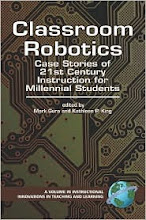"Five Tools That Are Transforming STEM Education
The K-12 classroom doesn’t look the way it used to."
Here's a very nice little article from Atlantic Magazine that identifies 5 different "tools" that teachers can use to transform the instructional experience in STEM subjects (SCIENCE, Technology, Engineering, and MATH). The article points out that “integrating these new tools into their lessons can help teachers reinforce theoretical concepts by demonstrating their real-world applications. By showing students that the knowledge is relevant and useful, teachers can help them unlock new realms of creativity in all scientific realms and possibly change their future career trajectories.”
I agree, it is inspiring to know that these tools are available (largely at accessible prices, as well) and that some teachers are already using these in their work with today's students. The very unfortunate and inexcusable downside to this, however, is that it is still a rarity for students to have this as part of their experience, at least in the all-important context of their regularly scheduled, required classes. Alas, even for that minority of students who get to work with these instructional tools, the majority of their use is relegated to After School and Summer "extra" interest classes and clubs where they help but don't really bring about the transformation that the author of this article alludes to. I've been speaking out to change this for a long time, now.
Robotics, and the other tools and approaches listed here should be part of every student's experience in an ongoing fashion. And there really is no reason for us to accept anything less than our schools actively using important technologies like the ones described here to captivate and educate our students. This should not be a curiosity or an extra or a special treat for our kids. It should be part of the very core of the education that they receive. That's why I wrote Getting Started with LEGO Robotics, so that the average teacher, without need for elaborate training and professional development, can bring these magnificent learning tools into their classrooms across the curriculum, even in subjects that are not thought of as STEM subjects (yes, there are important connections in Social Studies and Language Arts, too, as students study the impact of robots on our society and use language to describe the human experience of technology development and use).

"Twelve-year-old Shubham Banerjee creates a braille printer out of Legos. (Wikimedia)
Since ancient times, scientifically minded people have tried to figure out the mechanisms behind the physical world. Astronomers observed the movement of the sun and stars, biologists watched humans and animals interact with their environment, engineers noticed the angular similarities behind structurally sound buildings. They may have had simple tools to aid them—a basic measuring device, a compass, perhaps an early telescope.
Today, teachers of science, technology, engineering, and mathematics (STEM) topics mostly stick to the theoretical aspects. Students must know the number of degrees in a triangle, but rarely do they get to put that knowledge to use through structured lessons.
The tools listed here are transforming the way teachers approach STEM education. Integrating these new tools into their lessons can help teachers teachers reinforce theoretical concepts by demonstrating their real-world applications. By showing students that the knowledge is relevant and useful, teachers can help them unlock new realms of creativity in all scientific realms and possibly change their future career trajectories.
LegosUsed as manipulative teaching aids, raw materials for the next great robot, or simply building blocks for young students, Legos are great tools in the STEM classroom. Lego itself has developed a curriculum for how to use its products in schools. Lessons range from helping young students pair math concepts with how they are written to creating sophisticated robots that can complete specific tasks. Lego also organizes a number of robotics competitions for students from age 6 to 18..."
Read the rest of the article at its source: http://www.theatlantic.com/education/archive/2014/11/five-tools-that-are-transforming-stem-education/382305/#disqus_thread



No comments:
Post a Comment